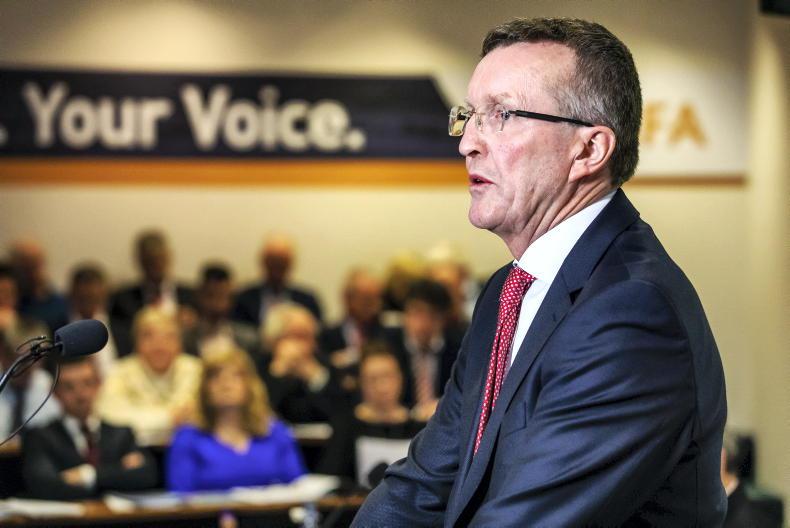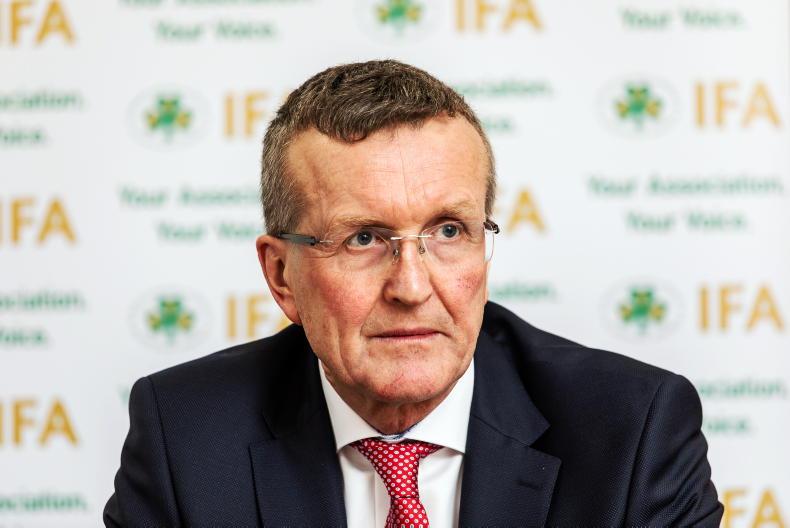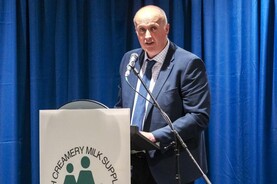IFA president Tim Cullinan is two years in office this week, halfway through his four-year term.
CAP reform and COVID-19, among other issues, have dominated his time in office to date.
Last October, Minister for Agriculture Charlie McConalogue announced that Ireland would have 85% convergence, 25% eco schemes and 10% front-loading in the next CAP. At the time, Cullinan said that the Government wasn’t interested in supporting active farming.
The IFA had sought 75% convergence, wanted the impact of eco schemes on direct payments minimised and it made no submission on a Complementary Redistributive Income Support for Sustainability (CRISS), known as front-loading.
When asked by the Irish Farmers Journal this week ahead of the IFA’s AGM if those CAP proposals represented a defeat for the IFA, Cullinan was almost bullish.
“No, I wouldn’t. It was agreed to converge to 75% by 2027 and that’s why we were very clear in our position, that we were asking our minister to hold at 75%. Look, he held at 85% and that in itself was a challenge for us, to hold the minister at the 85%. The CRISS was one, I think, that even took our minister and his officials by surprise.
“Looking at our proposals, we realised the whole focus was changing here but there was a cohort of farmers going to be severely impacted here and that’s the livestock, the sheep and the tillage sector,” he said.
Cullinan admitted that there are winners and losers to front-loading. “It is mandatory and there’s a point in time, you know if something is going to happen then you have to accept it.
“You try and compensate it in another manner, which is by getting more national co-financing for that cohort of farmers,” he said.
He said he was disappointed that the minister didn’t include the €40m BEEP-S proposal in the CAP strategic plan going to Brussels, adding that the IFA will now be lobbying Government each year for the payment.

When asked if he believes IFA membership is good value for money, Cullinan said he does. He said that there was a point in time when he was “the only farmer representative in Brussels on the ground, lobbying away”.
“Last week, we had a delegation in Strasbourg influencing our MEPs. We lobbied our French counterparts, our Dutch and our Danes. That’s value,” he said.
With €15m in income in 2020, Cullinan said the IFA is in a “healthy position” again.
“If we’re out there and farmers see we’re coming forward with policies, we’re fighting the fight on behalf of farmers – let it be here at home in Dublin with the national Government or in the EU. I think farmers will support our association into the future.”
The Tipperary pig farmer believes that when it comes to climate change, farmers have to get paid for the carbon sequestered on their farms and that he is concerned about a food crisis occurring in Europe.
“The world population is still growing… we need to produce more food and where better to do that than Ireland. If we don’t we’re looking at carbon leakage,” he said.
The amount of carbon that farmers are sequestering needs to be monitored and measured and farmers need to be properly rewarded for that, he said.
Example
Giving the example of a farmer installing 30ha of solar panels, Cullinan said that that farmer is now producing food and energy.
That farmer needs to be either paid a tariff or a completely new payment outside of the CAP for producing that energy, he said.
“Governments are in tunnel vision. They’re not looking at new proposals, new ideas for farming. We’re getting all the lip service from all governments, here in Ireland, I get the same in Europe.
“We’re being told we’re part of the solution, we’re not getting the funding to back that up and I think farmers can play a huge role in all of this but we need funding around it.”
Cut emissions
The IFA president accepts farmers have to cut emissions and that farmers will work and strive to get to the minimum 22% reduction in emissions required by 2030, but that there needs to be immediate engagement with farmers.
Has the IFA adopted a position on the Glanbia deal?
“At the end of the day, it’s not for the IFA or any farm organisation to decide a position a co-op wants to take, whether they want to continue with the plc route or decouple themselves from the plc.”
How would you vote the minister’s performance out of 10?
“There’s always more the minister could do. There were a number of issues around the CAP. Definitely the minister could have done more to support the productive sector within the CAP reform. How this minister will be measured I think – the next number of months in our sector are going to be hugely important.”
Will IFA have any issue with a possible Sinn Féin government?
“Look, the IFA’s job and my job as president, whoever is the minister or the Government of the day I will work with them. If there’s a change of Government then we’ll work with whatever Government is in power on the day and we’ll be driving our policies.”
What are your three priorities for 2022?
“Work around climate, get better returns for farmers with prices creeping up and the nitrates derogation – it’s critical for intensive sectors.”
Is the director general’s contract being renewed?
“Look I’ve a very clear policy, we don’t discuss staff issues.”






 This is a subscriber-only article
This is a subscriber-only article










SHARING OPTIONS: